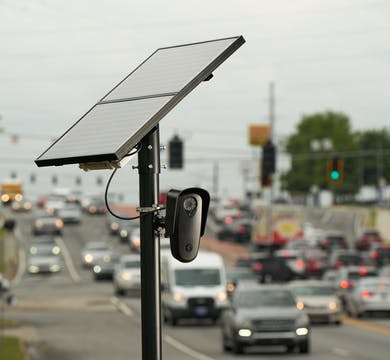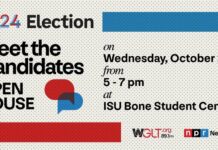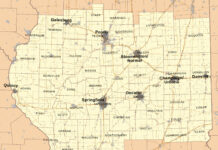By Ravi Duvvuri1
Should Bloomington buy Flock Safety ALPRs for the BPD?
I’ve been meaning to write up my thoughts about the Bloomington Police Department’s initiative to contract with Flock Safety for Automated License Plate Readers (ALPRs). Unfortunately, I just haven’t been able to get something written until now which is a shame because the vote is coming up and I Have Thoughts.
I want to again thank BPD Police Chief Simington and Crime and Intelligence Analyst Supervisor (CIAS) Jack McQueen for their presentation at the Technology Commission meeting on January 25th. They provided a lot of useful detail about the intended use of the Flock Safety ALPRs and their philosophy around the use of camera surveillance. As I mentioned at that time, I think this information is where the public conversation should have started, and civic engagement and education should have started earlier in the process. When our officials speak about community policing and promise that they want to work with the residents of the city to improve public safety, that should mean that there are meaningful opportunities for the public to help shape and steer those policies.
After the coverage of the issue in the local media, I took some flak from some friends and other folks for seeming to be giving a full green light to the approval for the purchase of these cameras, and for not standing up to the potential dangers of this technology. I think that’s a little unfair. I recommend people to watch the YouTube recording of the meeting for the full context, and not a few select pull quotes.
Here’s the thing: it’s almost a certainty that the police department is going to get the Flock Safety license plate readers. They already had the votes when it first came up for a vote, but the council tabled the vote because of the optics of passing it as a consent agenda item without any public discussion. We have heard from at least one city council member that now that the police have spoken, there is no obstacle and no more discussion needed for them to vote to approve the contract.
Furthermore, arguing against the police having better tools to help solve crime will always been a losing position. Frankly, it is a good thing if the police have better tools at their disposal. I don’t personally oppose that.
The concern has always been with the application of the technology, which exists in several legal gray areas. The difficulty comes in explaining the nuances of this technology and how it can be abused, when the argument in favor of ALPRs is always a simple-to-digest “this camera will help us catch people fleeing the scene of a crime”.
The concern around ALPRs is not about individual pictures of individual cars driving by a single spot, but about how that data can be aggregated and analyzed en masse, how new technologies and faster computing resources enable ever-evolving abilities that the laws and the courts cannot keep up with. Additionally, the blending of government entities working with private industry creates a murky mess of privacy concerns, data ownership, and uncertain accountability. No, this is not a matter of denying the police department these tools. This is about making sure the policies governing their use are well-thought-out, robust, and comprehensive, with the public-at-large’s and the city’s best interests at heart. The police will get the best tools to tackle crime, but it may take a little longer to make sure all the details are worked out.
I think CIAS McQueen said many things that were reassuring about how they intend to use these cameras and how they intend to limit the possibility of abuse. As Council Member Mathy said, they answered pretty much every question that he had about this implementation. However, the answers provided by BPD don’t always match the actual letter of the draft policy or contract with Flock Safety that have been presented. I believe we should have those matters settled and codified before the purchase of this contract is approved. I will detail some of the specific concerns I have with the proposed policy below.
Lingering concerns:
- The policy was presented as a strong framework to clearly communicate the intention of how BPD will use this technology, including clearly defined terms on what would be allowed use and what would not. It was claimed that this policy would remain in place in the case of a change in police department leadership. Given the frequent turnover in the position of BPD Chief, that’s an important consideration. However, there is nothing in the policy to indicate that it is a durable policy, nor is there any detail on how it would be approved or how the policy would be amended. As communicated, the policy is created, modified, and maintained entirely at the discretion of the BPD. I don’t think it’s unreasonable to have a final draft of the BPD proposal in place before the contract with Flock Safety is approved.
- The presentation by BPD stated that ALPR usage will be limited to major crimes, such as homicides, robberies, assaults, and the like, and that they would not be used for traffic violations or immigrations enforcement. However, those details are not included in the policy as presented. Instead, the definition used was “a crime of violation of law, excluding minor traffic enforcement”. While no one wants to bind the hands of law enforcement and prevent them from doing their jobs, if the promise to the citizens of Bloomington is that this tool will not be used for immigration monitoring, and that it is only for major crimes, that should be clearly defined in the policy. Further, according to the presentation, Flock Safety data will be cross-indexed with the FBI National Crime Information Center, which creates alerts when a connected camera detects someone in that database. This database *does* include immigration violations, so it is unclear whether outside agencies such as ICE would be able to leverage Bloomington’s cameras to surveil it’s citizens, even if BPD does not. It was also claimed that Flock Safety is contractually prohibited from accessing the data, except in aggregate form; cannot sell the data; and will automatically delete all image data stored in the cloud. This does not preclude Flock Safety retaining any metadata scraped from captured images, nor using the aggregate data as part of a larger dataset. I believe the ALPR policy should clearly define the categories of crimes they will be used for, and more importantly clearly define that immigration enforcement will be a prohibited use, given that the BPD is making that claim. Furthermore, I think it needs to be clarified that any usage for non-violent crime by any agency will be prohibited, to prevent outside agencies from using Bloomington cameras for those purposes.
- CIAS McQueen provided a good overview of how the camera placement was determined. I greatly appreciated this explanation, particularly from a data geek perspective. For the sake of the community, I think there should be an audit of actionable license plate queries for each camera to evaluate whether there are any racial or socioeconomic disparities in who ALPR data is being used against.
- Some clarification is needed around the function and capabilities of the Flock Safety cameras. According to the BPD presentation, the Flock Safety cameras will only upload images and metadata for license plates that are cleanly photographed and recognized. However, according to Flock Safety’s own literature which they submitted as part of the proposal before the City Council last month, they can capture partial plates, obscured plates, and missing plates. It may be a relatively minor point, but I think we should know whether there was a miscommunication by Flock Safety about the function of the cameras to BPD or to the City Council. There have been many recorded instances where a license plate was mistakenly identified as a different plate, leading to innocent people being arrested or physically hurt during traffic stops. We need to know if the system truly will not capture and record incomplete or missing plate data. Related to that, it was stated that the 30 day retention period for data could only be extended by an act of city council, yet those terms do not appear in the contract. Again, clarification would be useful to avoid making decisions based on unintended inaccurate assumptions.
- The main questions that myself and the other members of the Bloomington Technology Commission raised during the presentation were around the areas of data governance, auditing, and transparency. To start, it is virtually unheard of for a division or subunit of an organization to create its own governance and be responsible for its own oversight without any apparent review from outside auditors, whether that’s a major insurance company or a university. The promise of monthly transparency reports is welcome, and while it’s understandable that there is a need to anonymize that data for publishing to the public portal, it did not seem there was any system for an annual outside review and that any auditing would be reported internally. Furthermore, it was not clear whether any outside users, such as officers from other cities who have been granted access, would be included in these audits or transparency reports. I believe there needs to be a definite and clear audit and reporting process detailed in any finalized policy, and the current policy as presented does not meet reasonable standards, at least to the satisfaction of those of us on the Tech Commission who questioned it.2
To recap: ALPRs can be a powerful public safety tool, but they can also be easily abused. The Bloomington Police Department has made it clear that they have well-reasoned privacy-minded policies in mind for using these cameras and have put a lot of careful thought and consideration into developing them. Given the stated goals of the BPD, it shouldn’t be an obstacle to make sure the policy documents are finalized and approved before ratifying the contract with Flock Safety.
This article was originally published on Strangecornersofthought.com.
- Note: Ravi Duvvuri is a member of both Bloomington’s Technology Commission and the ACLU of Central Illinois. All views expressed are his own. Furthermore, this statement is intended to evaluate just the policy and contract as presented, and do not reflect concerns with the technology as a whole and historic abuses of the tech.
- To reiterate, I only speak for myself here, and not the other members of the Technology Commission. I did not speak with the others after the meeting, and am only conveying my interpretation of their questions and comments during our meeting.



































